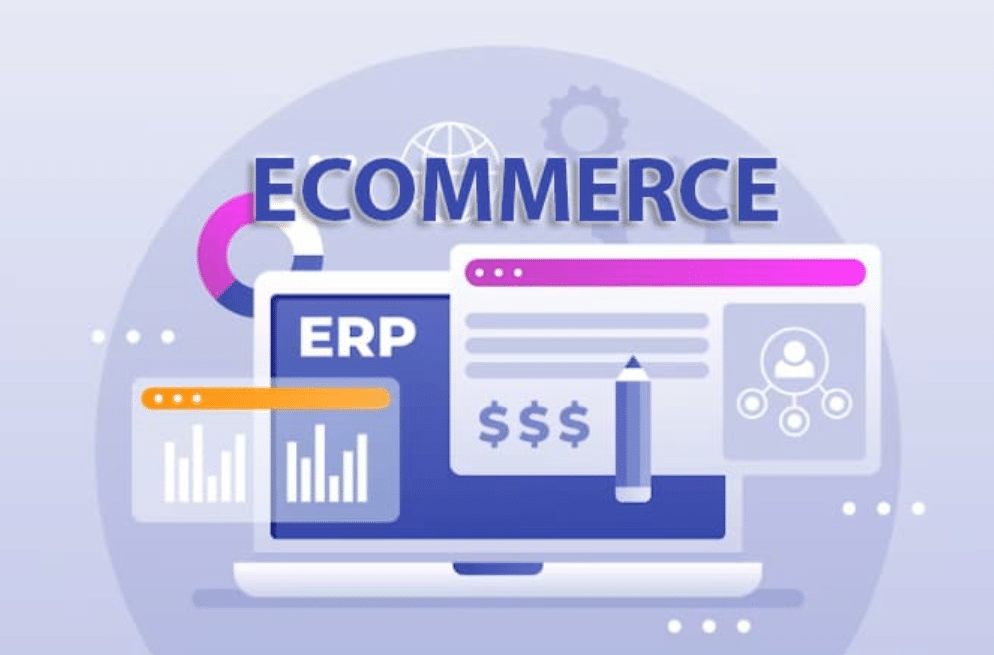ERP E-commerce – The digital marketplace is constantly evolving, and with the advent of Enterprise Resource Planning (ERP) systems, e-commerce has undergone a transformative shift. This guide delves into the essence and significance of ERP within the e-commerce landscape, underscoring the pivotal role of integrated business processes in propelling online retail to new heights.
ERP E-commerce
Core Features of ERP in the E-commerce Ecosystem
- Order Management and Fulfillment: ERP systems excel in e-commerce by streamlining order management and fulfillment. They ensure that every order is processed with precision, from the initial click to delivery, contributing to punctual and accurate fulfillment and elevating the customer journey.
- Inventory Oversight and Regulation: The backbone of any e-commerce business is its inventory management. ERP systems offer real-time oversight and regulation of inventory levels, averting stock shortages or surpluses and guaranteeing product availability for consumers.
- Customer Relationship Management (CRM): CRM capabilities within ERP systems are the catalysts for nurturing customer relationships. They enable meticulous tracking of customer interactions and adept management of marketing initiatives, fostering a tailored and uninterrupted customer experience.
Advantages of Deploying ERP in E-commerce Ventures
- Operational Cohesion and Enhanced Productivity: By unifying various business operations, ERP systems dissolve operational silos and diminish manual labor, leading to a surge in productivity and streamlined management of tasks like order processing, inventory control, and customer service.
- Superior Customer Experiences: ERP systems’ efficiency and seamlessness translate directly into exceptional customer experiences. They facilitate swifter order processing, precise inventory updates, and refined customer communication, cultivating loyalty and satisfaction.
- Informed Decision-making Through Real-time Insights: The implementation of ERP in e-commerce grants access to real-time data insights, empowering businesses to make strategic decisions informed by the latest sales data, inventory levels, and consumer behavior patterns.
Industries Reaping the Rewards of ERP in E-commerce
- Online Retail: ERP systems are integral to managing the complete e-commerce process for online retailers, from order placement to inventory management, ensuring a frictionless operational flow.
- B2B E-commerce: The B2B e-commerce ERP systems enhance order processing and inventory management, smoothing out transactions and fortifying business relationships.
- Omnichannel Retail: For omnichannel retailers operating across multiple sales platforms, ERP systems’ centralized data management and integration capabilities ensure uniformity and consistency, offering customers a cohesive shopping experience.
Optimizing E-commerce Operations with ERP
- Bridging Front-end and Back-end Operations: ERP systems seamlessly connect the customer-facing front end with the operational back end, from websites to inventory and order management, ensuring a unified and synchronized e-commerce ecosystem.
- Automating Routine Tasks: ERP systems’ standout feature is their ability to automate routine tasks. This liberates e-commerce businesses from manual drudgery and enhances accuracy, thereby freeing up time for strategic pursuits.
- Centralizing Data Management: For e-commerce businesses inundated with data, ERP systems provide a centralized data storage and management repository, ensuring all departments have access to precise and current information.
In essence, ERP systems are not just tools but strategic partners in the e-commerce narrative. They drive efficiency, customer satisfaction, and informed decision-making, ultimately shaping the future of online retail operations.
Refining E-commerce with Tailored ERP Solutions
Adapting ERP to Unique E-commerce Demands
In the diverse world of e-commerce, ERP systems stand out in terms of their ability to be customized. Acknowledging the distinctiveness of each online business, these systems offer a spectrum of customization options, ensuring a perfect fit for the specific needs and complexities of various e-commerce operations.
ERP: Scaling with Your E-commerce Ambitions
ERP systems boast remarkable scalability, catering to the dynamic range of e-commerce businesses. From the quaint charm of a small online boutique to the bustling activity of a vast e-commerce platform, ERP systems are designed to grow and adapt to your business’s expanding horizons.
Blueprint for ERP Implementation in E-commerce
- Strategic Planning and Evaluation: Strategic planning and thorough evaluation are the foundations of a successful ERP implementation. A deep understanding of an e-commerce business’s present workflow and future aspirations is vital for seamless integration of ERP solutions.
- Empowering Teams with Knowledge and Support: The transition to an ERP system is a journey of learning and adaptation. Comprehensive training programs and dedicated support services are essential to empower e-commerce teams and ensure they leverage the ERP system’s full potential.
- Continual Evolution for Peak Performance: The digital marketplace is ever-changing, and ERP systems must evolve accordingly. Continuous optimization post-implementation guarantees that the ERP system remains in sync with the changing needs of e-commerce businesses, ensuring sustained effectiveness and operational excellence.
ERP vs. Other E-commerce Solutions: A Comparative Insight
- Strengths and Opportunities for Growth: A comparative analysis of ERP solutions and other e-commerce systems illuminates ERP’s robust integration capabilities and areas for growth, guiding e-commerce businesses towards informed system choices.
- ERP’s Unique Selling Points: The spotlight on ERP’s unique attributes, such as centralized data management and real-time analytics, underscores its competitive edge in the e-commerce solutions landscape.
Success Narratives: ERP’s E-commerce Victories
Real-world success stories serve as concrete proof of ERP’s transformative impact on e-commerce businesses. These narratives demonstrate ERP’s role in streamlining operations, fostering growth, and contributing to the overarching success of e-commerce ventures.
Navigating the Digital Terrain: ERP’s Commitment to Security and Smooth Transitions
- Security at the Forefront: ISecurityis a paramount concern. In the digital age, ERP systems are fortified with robust security protocols to safeguard sensitive e-commerce data, ensuring a secure operational environment.
- Smoothing the Transition Path: The shift to a new ERP system can present challenges for e-commerce businesses. ERP providers are dedicated to offering support and resources to facilitate a smooth transition and potential disruptions to online commerce.
ERP’s E-commerce Horizon: Embracing Tomorrow’s Technologies
- Synergy with Cutting-edge Technologies: The roadmap for ERP in e-commerce is marked by integrating emerging technologies like data analytics and artificial intelligence (AI), which promise to revolutionize automation, predictive analytics, and decision-making processes.
- Data Analytics and AI: The Future Focus: As technological advancements continue, ERP systems for e-commerce are expected to increasingly concentrate on sophisticated data analytics and AI-driven functionalities, offering deeper insights and enhanced automation capabilities.
Voices from the Market: Endorsements for ERP in E-commerce
Collecting experiences from e-commerce businesses that have embraced ERP systems offers invaluable insights to potential adopters. Positive reviews and testimonials illuminate the tangible benefits and real-world impact of selecting these advanced e-commerce solutions.
Crafting the E-commerce Future: A Guide to ERP Selection
Decoding E-commerce Needs for ERP Integration
Embarking on the ERP journey in e-commerce begins with a deep dive into your business’s unique needs. A meticulous understanding of the specific functionalities that drive your daily operations is the bedrock of a sound ERP selection.
Assessing Scalability for E-commerce Growth
The growth trajectory of an e-commerce venture is pivotal when selecting an ERP system. A thorough evaluation of scalability and future-proofing ensures that your ERP choice is a companion in growth, adept at navigating the evolving tides of the e-commerce industry.
Journey Through Transformation: ERP’s E-commerce Success Story
A case study unfolds the narrative of an e-commerce business’s metamorphosis through ERP integration. This walkthrough chronicles the hurdles overcome and the milestones achieved, offering a panoramic view of ERP’s impact on e-commerce dynamics.
Epilogue: ERP’s Role in E-commerce Evolution
In summation, ERP systems are the vanguard of change in e-commerce, steering online retail towards a horizon of innovation. With their robust features, adaptability, and benefits, ERP solutions are versatile allies for e-commerce entities of every scale. As the e-commerce landscape flourishes, ERP systems are the quintessential instruments driving efficiency, expansion, and ingenuity.
FAQs
1. Is ERP in e-commerce only suitable for large online retailers?
- No, ERP in e-commerce is scalable and suitable for businesses of all sizes, including small and medium-sized online retailers.
2. How does ERP in e-commerce address security concerns?
- ERP systems incorporate robust security measures to protect sensitive e-commerce business data and ensure a secure operating environment.
3. Can ERP in e-commerce be customized to specific business needs?
- Yes, ERP systems offer customization options to tailor the system to the specific needs of each e-commerce business.
4. What industries benefit the most from ERP in e-commerce?
- Industries such as online retail, B2B e-commerce, and omnichannel retail find significant benefits from ERP in e-commerce.
5. What are the future trends in ERP for e-commerce development?
- Future trends include integrating emerging technologies, such as data analytics and AI, that focus on providing deeper insights and automation capabilities.

